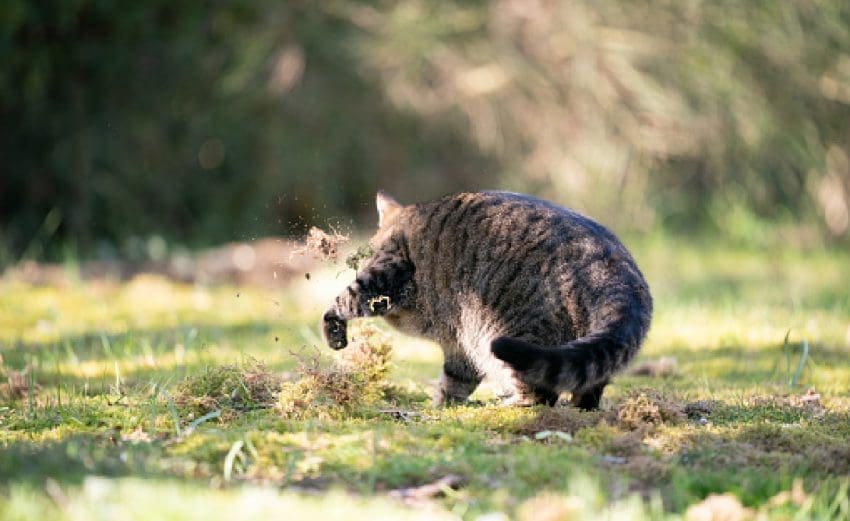If you’re a cat owner, you’ve probably wondered why your furry friend loves to dig on your bed. Is it just a quirky habit or is there a deeper reason behind it? In this article, we’ll explore the fascinating world of cat digging behavior and provide you with tips on how to prevent it.
Why Do Cats Dig on Beds?
Cats digging on your bed may be confused with kneading, which is a gentle scratching motion they make when they need affection or when they’re feeling nostalgic about their kittenhood. However, digging on the bed indicates that your cat wants to play with you. It could be that they didn’t get enough playtime during the day and they simply want to have fun. Male cats may also dig into blankets and pillows as it reminds them of their mothers, especially during breeding seasons.
While it may be slightly disruptive to your sleep, digging on the bed is not harmful behavior. However, understanding why cats dig on various surfaces can help you prevent this behavior.
Where Do Cats Dig?
Cats can dig on various surfaces, including beddings (such as pillows, blankets, and sheets), gardens, potted plants, tiles, hardwood floors, your skin, clothing, and dirt in the lawn. Every cat is different, so they may dig on one or all of these places.
Reasons Why Cats Dig
To effectively prevent your cat from digging on your bed, it’s important to understand why they do it in the first place. Here are a few reasons behind this behavior:
Seeking Affection
Cats are naturally affectionate animals. When they crave affection, they may start kneading on your bare skin or gently scratching your beddings with their claws spread out. Male cats, in particular, may dig on your bed to remind themselves of their mother’s affection during the breeding season.
Hiding Leftovers
Cats have a natural tendency to dig when hiding their food. This behavior originates from their wild ancestors who used this technique to mask their scent from predators. Nursing cats also bury their food to protect their babies. If your cat is digging in or around the food bowl, they may be looking for something tastier or trying to mark the area around the bowl with their scent.
Biological Needs
Although digging holes is a natural behavior for dogs, it’s not typical for cats. The only type of digging they should engage in is covering feces or odors in litter boxes or outdoors. However, some cats may dig in the garden or potted plants because the soil resembles a type of litter to them. Digging and covering also helps them mask their scent.
Marking Territory
Scent-marking is a common behavior among cats. They have scent glands in their paws, so when they dig or scratch on your beddings or other items, they are leaving their scent as a way to mark their territory. Male cats can also mark their territory by urinating or excreting.
Exercising and Hunting
Cats need daily physical exercise to maintain their health. Some cats have high energy levels and are genetically predisposed to becoming obese. If they don’t get enough exercise, they may start digging holes in your yard or even hunting for mice and bugs. Digging and covering their scent is part of their hunting behavior.
Stress
Stress can bring out the worst in cats. They may try to hide it, but it can manifest in destructive habits like excessive digging, scratching, or running around. Understanding and addressing the source of their stress can help alleviate this behavior.
How to Prevent Cat Digging on Your Bed?
To prevent your cat from digging on your bed, try the following steps:
Get a Scratching Post
A scratching post provides a safe and appropriate place for cats to scratch. It helps them maintain their nail length and keeps them busy when they’re bored. You can also spray the scratching post with catnip to further entice your cat and redirect their attention away from your bed or furniture.
Give Them Outdoor Time
While some cats are content being indoors, most cat breeds benefit from outdoor time. Allowing them to explore, hunt, and dig outside can fulfill their natural instincts. If you have a secure outdoor space, let them out under supervision or consider creating an enclosed outdoor area for them.
Respond with Affection
If your cat continues to dig on your bed despite having a scratching post, it may be a sign that they need more attention and affection. When you notice them digging, pick them up and cuddle with them until they fall asleep. This can help fulfill their need for physical closeness and reduce their desire to dig on your bed.
Train and Play with Your Cat
Instead of punishing your cat for scratching, engage them in interactive play sessions. Use toys that mimic prey or create a routine where you play a certain game with them before bedtime. By associating playtime with sleep, they’ll be more likely to tire themselves out and avoid destructive behaviors.
Make it Uncomfortable for Them
If your cat tends to dig in other areas like potted plants or furniture, there are several strategies you can try to deter them. Hang indoor plants out of their reach or create physical barriers around them. Use orange spray or cover the soil with orange peels, as cats dislike the scent. Cayenne pepper can also deter digging in potted plants. Cover the soil with aluminum foil, ensuring there are holes for air circulation, or use smooth stones as deterrents. A citrus spray can be effective on furniture and other areas where your cat digs. You can also use devices that emit unpleasant sounds when they start digging. Additionally, avoid leaving cat food on the floor to prevent digging on carpets.
Frequently Asked Questions
Coming Soon
Conclusion
If your cat continues to dig on your bed and other areas despite your efforts to prevent it, it may be worth consulting with your veterinarian. Chronic anxiety or other underlying issues may be contributing to this behavior, and your vet can provide guidance and recommendations on how to help your cat. Remember, each cat is unique, so it may take some trial and error to find the most effective strategies for preventing digging behavior. Share your own experiences and tips in the comment section below.


